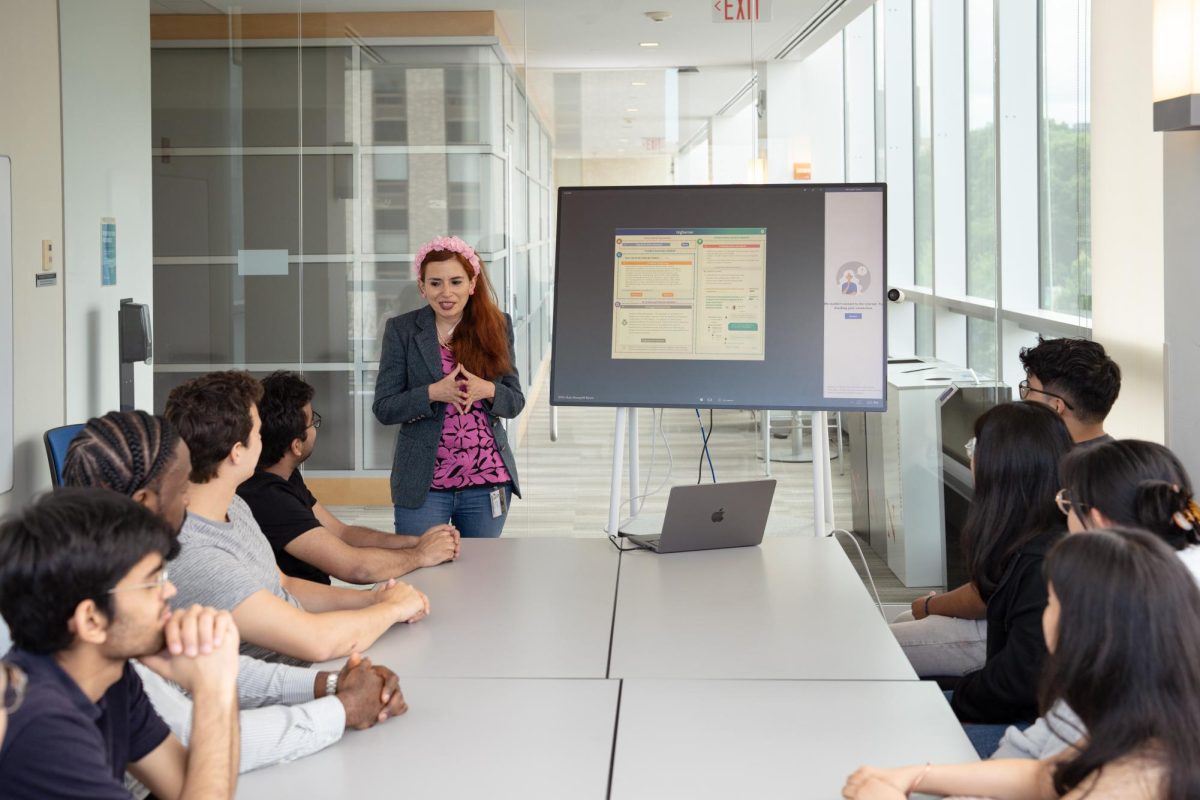Dark academia trend shines on TikTok
“Amiens gothic architecture” by barnyz is licensed with CC BY-NC-ND 2.0. To view a copy of this license, visit https://creativecommons.org/licenses/by-nc-nd/2.0/
January 27, 2021
While Angela Misutami, a sophomore at Providence College, was scrolling through TikTok, she found something odd. The app’s algorithm switched from videos related to Slytherin, her Hogwarts house, to a spate of videos of young people studying in visually appealing outfits, romanticizing past trips to libraries, studying ancient languages and showing off their tweed outfits.
These people were all part of an aesthetic called dark academia, and Misutami was hooked. She began using the material features of the aesthetic to help her romanticize studying in her own childhood bedroom.
“I liked the aesthetic of like leather notebooks and using fountain pens and ink, and, as a student, the idea of romanticizing academics was very appealing,” she said.
Misutami wasn’t the only person who found these videos compelling. Dark academia began years ago on Tumblr as a way for people interested in the humanities, especially the classical studies, to find others with similar interests, but during the COVID-19 pandemic, the subculture exploded and found a larger, captivated audience on TikTok.
There’s no set definition of dark academia. Part of why it’s so nebulous is that it’s an “aesthetic.” On the internet, aesthetics are subcultures based mostly around fashion, art and decorations. Dark academia has a lot of non-fashion traits, but there are people who only participate in certain facets of the aesthetic, which makes getting a clear definition difficult.
However, common elements of the content under the dark academia hashtag (#darkacademia) on TikTok include studying the classics, vintage books, New England liberal arts colleges, Oxbridge universities, Victorian or Gothic architecture, Donna Tartt’s “The Secret History” and tweed.
Watch on TikTok
Auden Wiernik, a Connecticut-based dark academia TikToker who posts under @linguistudy and second-year linguistics student at the University of Edinburgh, said that “there are definitely some books that have themes that are core to the aesthetic.” They specifically mentioned Donna Tartt’s 1992 campus novel, “The Secret History,” and her follow-up novel, “The Goldfinch,” as books that loom large in the subgenre.
“The Secret History” is emblematic of the subgenre as a whole; It’s a murder mystery that follows a group of friends studying the classics at a fictional elite Vermont liberal arts college through the events related to the murder of one of their friends.
However, Wiernik explained that whether or not a person likes dark academia books or books from traditional western cannon shouldn’t be (and often isn’t) a barrier to entry.
“There are other specific things to my major or a biology major – something that’s not in humanities – that can also [help one] participate in the aesthetic without having to have a shrine to Jane Austen or something like that,” Wiernik said. “It’s important to an extent, but it shouldn’t be exclusionary… Knowledge can be expressed in so many different ways.”
Eric Adler, a classical studies professor at the University of Maryland, said the type of media that dark academia favors has long helped young people discover the classics as a field of study.
“When I majored in classics in college, one question I would routinely get is, “Have you read Donna Tartt’s ‘The Secret History?’” This was a big deal,” Adler said. “Not only books, but also Hollywood movies end up having an influence on people studying the classics.”
From Jan. 10-16, there were 13 times as many Google searches for the term dark academia as there were in late March, according to Google Trends data, As of writing, creators have uploaded over 466 million videos under #darkacademia on TikTok.
Claire Schreiber, a second-year psychology and classics student at the University of California, Santa Cruz who makes dark academia TikToks under the username @fruithief, explained that participating in the aesthetic aspects of dark academia has helped her stay motivated to do well academically during the pandemic.
“When I get up in the morning, I always make a point to like, dress up a little bit and have fun with getting ready and going to Zoom class even though I’m just sitting alone in my bedroom,” she said. “Getting dressed up, looking a little classy to just sit around and do work has been really nice.”
Dr. Jay Soucy, a clinical psychologist in Lincoln, Massachusetts, said that many students have had a difficult time coping with the upheaval caused by the pandemic. A Center for Disease Control, or CDC, study published in November found that mental health emergencies among the 12-17 year old age group rose by approximately 31% between April and November.
Soucy explained that “social disconnection” is the biggest issue for college students.
“I’d see [virtual communities] as part of the solution. A lot of right now is just about getting through, and virtual communities can be important,” Soucy said.
One way that people access this virtual community is through Discord. Discord is a platform that lets users create online servers where they can talk or text with each other in different channels (think Slack for gamers). Servers for people interested in dark academia (and its close cousins, light academia, grey academia and green academia) have multiplied in numbers. Misutami’s server, “Dark Academics”, currently has 135 members, affectionately called “students”, and offers member-led classes on topics ranging from the Japanese language to reading tarot cards.
“[Dark Academia] has led to new interests that I may not have engaged in otherwise. Like, on the Discord [server] that I’m in, I’m doing the classes on there,” Misutami said. “Romanticizing academics encouraged me to participate more in those online classes and to just learn new things in general.”
Loyola University of Chicago assistant professor of marketing Jenna Drenten explained that social media is a key part of identity formation in the modern age.
“It gives people a place to play around with their identities. That can be positive, or it can be really negative,” Drenten said. “It can be liberating to participate in a community where people are like you and where you can connect with others.”
The Resurgence
While the original dark academia community on Tumblr is still going strong, the place where most new dark academia fans learn about it nowadays is TikTok.
Schreiber prefers making and consuming dark academia content on TikTok over Tumblr.
“I think it’s because with a video format, you have like the fashion base, but then you can also add the music behind it, and I think it just makes it a more immersive experience,” she said.
Drenten said TikTok’s audiovisual components are part of what makes the way that people form identities on TikTok different than on other social media platforms like Tumblr.
“Identities get formed around certain sounds, and you affiliate communities and identities with certain songs, and they become part of that identity. For example, being a Harry Potter fan or a cosplayer is part of an identity, and there are sounds associated with them,” Drenten said. “The sound brings more people together.”
One of the most popular sounds under the dark academia hashtag is a clip from the original score for the animated movie “Howl’s Moving Castle.” Other popular sounds have the same dramatic, orchestral vibe.
Wiernik, however, pointed out that both communities share a diversity problem.
“What’s perpetuated is thin, white girls in England, or in places that are very rich, and it’s this really specific aesthetic that a lot of people don’t fit, and it seems so exclusionary — especially when academia in general is usually … such a male-dominated, white-dominated field. I think perpetuating that online just takes us back so many years,” they said. “It’s really disappointing that it’s happening online, again, when there are just voices of so many other people, especially people of color and queer people and disabled people who have such an interesting and different take on academics and the school system in general.”
Soucy worries about the effects that relying on an online community during a pandemic could cause. He explained that oftentimes, people only post the best aspects of their lives, especially their academic lives, on social media.
“If you’re existing in this world, there’s no way not to be affected, and I worry that online spaces send the opposite message,” Soucy said. “Some think ‘Why am I not the most studious?’ People feel worse even though it’s all superficial.”
Still, for many, the dark academia community has helped them fight sadness while home from school.
“Not that I feel ostracized at my hometown, but there aren’t a lot of people with such an interest in education and really pursuing that as a career or putting a lot of time into studying. … It’s reassuring to find that there were people who believe in the same thing, and who I can really relate to….,” Wiernik said. “Being able to have really great and intellectual conversations, that’s something that I really, really appreciate and really cherish in my life … I just think that’s like such a lovely, lovely thing to be able to have this shared interest.”







